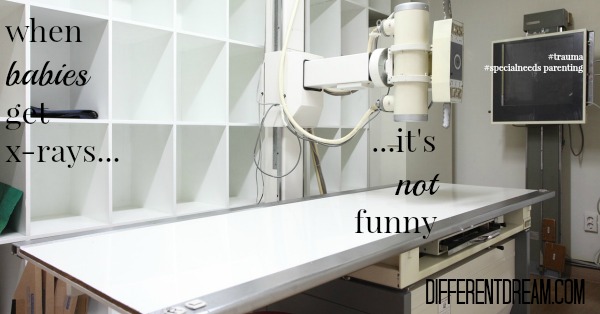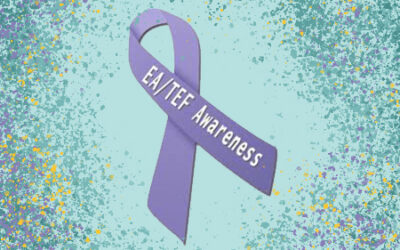Why Pediatric X-Rays Aren’t Something to Laugh About

Like so many other parents of kids with special needs, I have a good sense of humor. Not because I’m innately funny but because, like as so many other parents in the special needs community have learned, humor is a powerful coping mechanism. Much as we like to laugh, not many of us found an IJReview website post about a contraption used for pediatric x-rays very funny. Even though the post was tagged in the categories of health, humor, and weird news.
Why Pediatric X-Ray Pictures Aren’t Funny to Me
The pictures on the site, all of them with tongue-in-cheek captions, brought back memories of one of my hardest nights ever as a mom. Our five-month-old’s feeding tube was looking funky, so we rushed him to the Rapid City hospital (120 miles from home). When we got there, the Rapid City Regional Hospital was in the middle of its move from an old, outdated building to a brand spanking new one. All but one of the rad techs was moving equipment to the new hospital. So the tech showed me how to strap my baby into the contraption featured in the IJReview pictures.
My son screamed hysterically throughout the procedure, which the tech said was good because his lungs would inflate and produce a better x-ray. My burning memory is of my son sobbing and looking accusingly at me, his mommy who was supposed to protect him, strapping him into a cold, hard contraption and walking away. Never mind that Mommy came back and calmed him down. That memory is trapped deep inside both mother and son forever.
With that in mind, here are 3 reasons pediatric x-rays shouldn’t be funny. To anyone. Ever.
3 Reasons Why Pediatric X-Rays Aren’t Funny
-
- Pediatric x-rays are only ordered if the doctor thinks something is very amiss for a child–serious injury or illness amiss. That’s not funny.
- Pediatric x-rays are traumatic for children. Contrary to popular belief, children do remember very early memories like pediatric x-rays. Those memories can contribute to mental health conditions like PTSD and anxiety later on in life.
- Pediatric x-rays and other pediatric medical procedures can be traumatic for parents as Different Dream’s recent series about PTSD in parents of kids with special needs shows.
What to Do Instead of Laughing at Pediatric X-Rays
Instead of laughing at pictures of pediatric x-rays and videos parents need to become educated about how to prepare children for pediatric x-rays and how to process and diffuse any resulting trauma for both child and parent. The last two chapters of Does My Child Have PTSD? (Familius, October 2015) address those issues in detail. The book also contains lists of resources so parents can find professional treatment for their children, if need be.
What’s Your Experience with Pediatric X-Rays?
What pediatric x-ray experiences have you and your child had? You are welcome to share them in the comment box, along with ideas about how to make the experience less scary for kids. Thanks!
Do you like what you see at DifferentDream.com? You can receive more great content by subscribing to the quarterly Different Dream newsletter and signing up for the daily RSS feed delivered to your email inbox. You can sign up for the first in the pop up box and the second at the bottom of this page.
By Jolene
Jolene Philo is the author of the Different Dream series for parents of kids with special needs. She speaks at parenting and special needs conferences around the country. She’s also the creator and host of the Different Dream website. Sharing Love Abundantly With Special Needs Families: The 5 Love Languages® for Parents Raising Children with Disabilities, which she co-authored with Dr. Gary Chapman, was released in August of 2019 and is available at local bookstores, their bookstore website, and at Amazon.
10 Comments
Submit a Comment
Subscribe for Updates from Jolene
Related Posts
How Can an EA/TEF Parent’s Anxiety Be Held in Check Before their Child Starts School?
Karena Skibinski shares her answers to the question: How can an EA/TEF parent’s anxiety be held in check before their child starts school?
Ringing in the New Year with EA/TEF Awareness Month
Jolene Philo is ringing in the New Year with EA/TEF Awareness Month for the fifteenth year at Different Dream.
When God Redeemed My Worst Christmas Ever and Used It for Good
Jolene Philo relates the tale of when God redeemed her worst Christmas ever and used it for good—42 years later.






I am in the process of doing EMDR therapy because of a series of childhood traumas (not just medically based, but also violence in the home and at school). It is helping, but progress is gradual.
What has gradually come out is that some of the most traumatic scenes were ones where I witnessed someone else’s trauma, or witnessed my parents’ response to it. Here is the worst. I was 6 or 7 and was at the pediatrician for a routine visit. I was waiting in the exam room with my mother, when we started hearing screaming from the next room. There was commotion in the hall as several doctors and nurses showed up. Over and over a girl screamed, “Don’t touch me!” I could hear the muffled voice of my doctor but couldn’t tell what was happening. My mom projected her own anxiety but did not seek to comfort me. This went on for what seemed like an eternity, but was probably about 5 minutes. That night, my mom brought it up at the dinner table, and my dad callously cracked jokes about what might have been happening to the girl.
An experience like this in isolation might be just upsetting, not traumatic. But when a child has already experienced trauma and the neurological damage it causes, a scene like this sends the nervous system into overload and burns the memory of it into the brain.
Hi LD,
Thank you for your feedback and encouragement. Like you, I understand the importance of raising awareness about this topic and have no plans to stop doing it. I am so sorry to hear of your double trauma–first from undergoing invasive medical treatment and then from your mother’s emotional response. Have you received any treatment for your trauma?
Jolene
I’m so glad that you are raising attention to this issue, Jolene. I have been undergoing EMDR therapy because of medical trauma. One of my earliest memories is at about age 3, being separated from my mother while my arm was X-rayed. To this day, I have difficulty with medical procedures because of several experiences like this in childhood. (I’m now 40.)
Please don’t take this the wrong way, but I need to say it. Caregivers need to make sure that they have their own needs taken care of first, so that they are able to give themselves 100% to their child at moments like this. What happened in my case was that my mom repeatedly became anxious and started crying whenever my brother or I had to have unpleasant medical procedures. Children are sensitive and pick up on cues from their parents about how to interpret a situation.
I now try to have some compassion for her, because I know that she experienced medical trauma in her own childhood and had never been able to deal with it. But it still makes me angry that she and my doctors were not able to put my own emotional needs first in those moments.
That’s so right, AJ. And of course, we have to remember that the scans help give our kids longer life than they would otherwise have. All the best to your family. Jolene
Those tiny phone keyboards are easy to mistype, sorry.
My daughter has had almost 30 CTs but has rarely had useful info, 4 shunt revisions so far. We do push back on CTs nowadays, only do them if surgery is more likely or they have reasons to check. Just tell the emergency dept doc that the kid has slit ventricles (ventricles have not changed for an obstruction, stay slit except once and shunt was working, imaging was for another reason) so a neurosurgeon is going to have to have a good reason to do one as the standard approach in the ER is to image a kid with a possible shunt problem. They do do low dose CT at our children’s hospital but that equates to slightly less radiation per slice and fewer slices, still many slices per CT. Tumors are still likely later in life after a fair number of head CTs, people who were successfully treated for cancer as kids often have health issues from treatment, lots of choices that have immediate benefits have some long term consequences. If you know the long term impacts, helps one make sure the imaging is done for good reasons.
Good for you, AK. Sounds like you are being the advocate your child needs both beforehand and during medical procedures. Keep it up! Jolene
You weigh the pros with the cons and go with the pros. And remember, the amount of radiation used is way down from the 1950s and 60s. Also trust that God holds your child’s life in his hands. Hang on to that, Crystal.
What scares me more is the lasting effects of the xrays. My son has a shunt and we get CT scans regularly. We have had probably 200 or more xrays and 20 Ct scans. I can’t even think about it or it stresses me out too much. What do you do when it’s necessary to keep them alive. So stressful. 🙁
We call the CT the big doughnut and the sticky markers they put on my daughter’s head cheerios, it just sounds less scary that way (now we just say CT, kid’s probably gong to have brain tumors from radiation later in life). X-rays are pretty easy for us. We correct child life when they suggest my 8yo doesn’t need anesthesia for a 40-60 min MRI because she would not cope, glad we don’t do that often. My daughter likes her neurosurgeon, he isn’t associated with poking her with anything.
We have experiences with pediatric MRI’s, which have been just as traumatic on me as they are on my daughter! After many years of annual anesthetized MRI’s they still aren’t a party, but we’ve come up with a few strategies that make them the procedure go a little easier. Sometimes I wonder if my daughter’s occasional aggression is caused by memories of her days in the hospital for brain cancer treatments. I can just imagine how she felt when I just stood by, not rescuing her when doctors hurt her. Thanks for sharing this at Faith, hope, and Love!